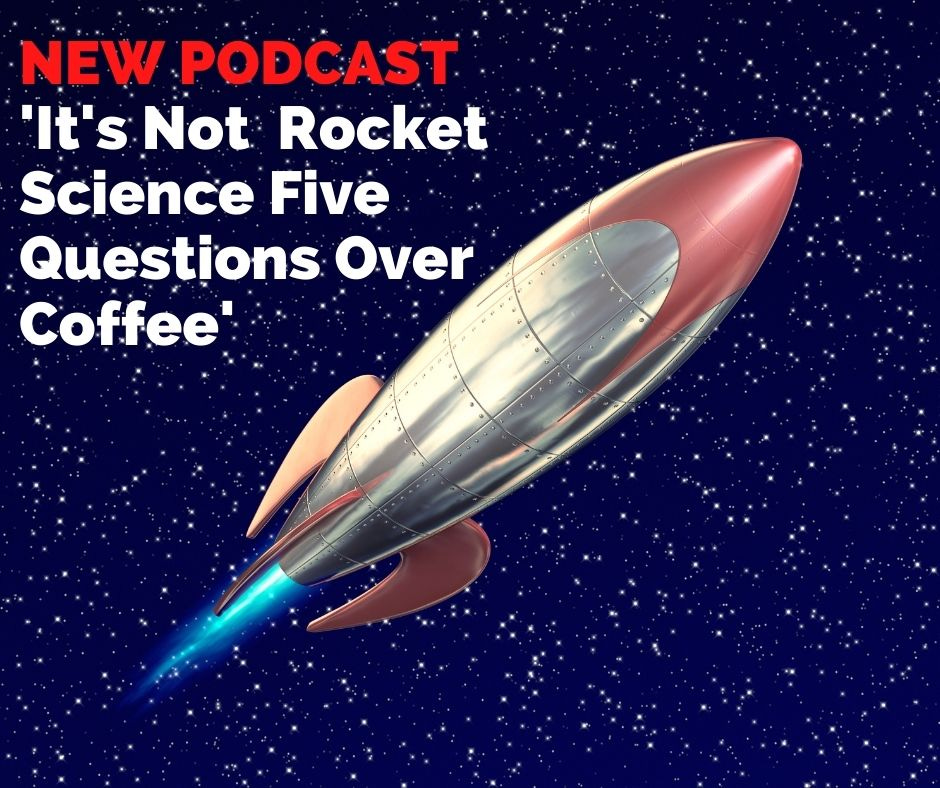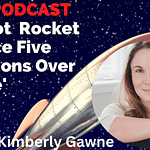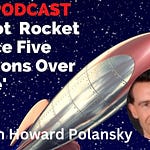Who is Rob?
A sought-after speaker and best-selling author, Rob Jolles teaches, entertains, and inspires audiences worldwide. His keynotes and workshops attract many diverse audiences, from Global 100 companies to growing entrepreneurial enterprises, from parents to professional negotiators. His best-selling books, including How to Change Minds, Why People Don't Believe You, customer-centred Selling and How to Run Seminars & Workshops, have been translated into more than a dozen languages. He lives in Chevy Chase, Maryland.
Key Takeaways
1. Master the process which you have spent time developing!
2. When developing sales training, think about the feedback needed to ensure that process is learned well
3. Can anyone sell. Yes! The best sales people create authentic conversations.
Valuable Free Resource or Action
There are valuable resources on www.jolles.com including Rob’s podcast at https://www.jolles.com/podcast/
A video version of this podcast is available on YouTube :
Subscribe to our newsletter and get details of when we are doing these interviews live at https://TCA.fyi/newsletter
Find out more about being a guest at : link.thecompleteapproach.co.uk/beaguest
Subscribe to the podcast at https://link.thecompleteapproach.co.uk/podcast
Help us get this podcast in front of as many people as possible. Leave a nice five-star review at apple podcasts : https://link.thecompleteapproach.co.uk/apple-podcasts and on YouTube : https://link.thecompleteapproach.co.uk/Itsnotrocketscienceatyt!
Here's how you can bring your business to THE next level:
1. Download my free resource on everything you need to grow your business on a single page
My approach is to provide you with tools, techniques and templates which have been tested and proven by me and hundreds of business owners like you to explode their business growth; get them "investment ready"; or develop a "prospectus for sale" to enable them to plan an exit. Here is a detailed breakdown of how you can grow your business to 7-figures in a smart and sustainable way. https://link.thecompleteapproach.co.uk/1page
2. Join The Complete Approach Facebook Group :
Connect with like-minded individuals who are all about growth and increasing revenue. It's a Facebook community where we make regular posts aimed at inspiring conversations in a supportive environment. It's completely free and purposely aimed at expanding and building networks. https://TCA.fyi/fb
3. Join our Success to Soar Program and get TIME and FREEDOM. :
If you're doing 10-50k a month right now: I'm working with a few business owners like you to change that, without working nights and weekends. If you'd like to get back that Time and still Scale, check the link : https://link.thecompleteapproach.co.uk/Success-to-Soar
4. Work with me privately
If you'd like to work directly with me and my team to take you from 5 figure to 6 and multi-6 figure months, whilst reducing reliance on you. Click on https://link.thecompleteapproach.co.uk/DiscoveryCall tell me about your business and what you'd like to work on together, and I'll get you all the details.
Transcript
Note, this was transcribed using a transcription software and may not reflect the exact words used in the podcast)
Stuart Webb 0:42
Hi again and welcome to It's not rocket science, five questions over coffee. That's far too many words to say, after you've had too much coffee, so let's just get straight into it. I'm here today with Rob. Rob jollies. Rob is, is going to give us some great tips. I know today Rob such a fantastic website. I've been on how to look at some of the stuff he talks about, about how authentic you need to be. So Rob, welcome to the podcast. Welcome to Five questions over coffee. Looking forward to the conversation very much indeed.
Rob Jolles 1:13
I'm ready for the challenge to work.
Stuart Webb 1:18
Let's see what we can do to challenge you then. So just tell us in a few sentences, what your ideal client problem challenge they have that you try and sort of help them to solve?
Rob Jolles 1:28
Yeah, you know, I in a sense, I have two clients. And I think we all have two clients. We have our client and then the client that client serves. So my clients when I thought about thinking about your question, first client is I'm a sales trainer, I typically teach sales to your classic sales groups, financial industry, things like that. But I wrote a book called How to change minds, which brought me into hostage negotiators, polygraph examiner's police departments, nurses, hospitals, that's my client. I'm trying I teach persuasion. So you know, they, the biggest challenge they have is, a lot of times it's budget. And it's real odd in my industry, when business is bad, and they need a sales trainer. Instinctively, they don't have the budget for it. When Business is great, and product is flying off the shelf. Now they have the budget, they don't really need me as much, I'm happy to take their phone call. It's odd, it should be complete opposite. You bring in a sales trainer when things that when you're struggling. But I think that's one of the biggest challenges is to kind of get them on the right side of that issue. But Stuart, that's one client. The other client that I believe I serve are the people that they're selling to Xerox, former Xerox guy, we call that the end user person who's using the box. And it's important that what I'm teaching salespeople is ethical. It's not manipulative, it under it focuses on the fact that people will struggle to make change. And you're going to have to ask more difficult, difficult questions, but getting into the whys in the house. So those are kind of my, my two clients, if you will, that struggle.
Stuart Webb 3:11
Robert, I love I love the idea. I mean, we could talk for many hours about the fact that too many business owners too many businesses, when they're things are going well fail to dig the well that they need, when the rain stops. There are so many business out there that that just forget the fact that things might change. And, you know, I love the I love the analogy you put there about you know, the time that they need a sales trainer is when they're in real trouble. But, you know, for me, I love hearing about sales trainers who talk about ethics, because it's such a sales is getting such a dirty, dirty word nowadays, but natural fat is all about ethics is about helping people at the end of the day.
Rob Jolles 3:50
Yeah, and you know, something, it's not always pretty. It you know, people don't understand that. I mean, the easy thing to say is and the tagline on one of my books is the art of influence without manipulation. So I'll draw a line and show them. But But Stuart, really, sometimes sales, you get your hands dirty. In other words, I do have to ask questions that don't always make you feel great listening to him. That's my responsibility. So what I've tried to do in the second half of my career is not necessarily drill down on you know how to do this, believe me, I'll tell you how. But I think we in the sales training industry, have a responsibility to teach people why we're doing this, so that they understood so that I don't just lay a process on you, but let's look at why.
Stuart Webb 4:37
Great, love it. And so that sort of takes me to the second question, Rob, which is, what are the common mistakes people make when they're trying to solve that problem with without help?
Rob Jolles 4:47
Well, it's odd because you're talking to an author, right? And I'm very proud of my books, etc. But I hope no one's listening. But but one of the issues is I think they're reading too many books. I really do. I think People think I've met sales managers who have proudly told me, I have my team reading a different book each month. And I'm thinking, Oh, my goodness. So you're basically teaching them golf lessons, and you're changing on the golf pro, every month. Let's assume all the golf pros are good for a moment. They're certified. They're good. They're all good. But what would your swing look like 12 months later, with 12 Different golf pros. So I think one of the biggest issues is, and it's like I say, it's tough for a guy who writes books to, to look my client in the face and say, if you have a process that's repeatable and predictable, and you're implementing that process, I don't think you want to read my book, don't read my book. There's there are plenty of other clients out there. But they struggle with that they want to listen to different tapes. So they listen to, you know, watch different videos. And I would, I would prefer that they stick with the pro they have, and we're not done by the way, and demand from that Pro. Okay, I've taken your lessons now what helped me and helped me work this strategically. I've got the process down, but get better at what Master what you're doing stop jumping off the ship.
Stuart Webb 6:09
Yeah, it is. It is a it's a tough lesson, isn't it? The the the fact is that, that go back to the golf swing. You can you can you can watch as many YouTubes as your YouTube videos as you like. But until you actually get out on the court on to the driving range and practice, practice, practice and work out what's going wrong. You do not improve. And that's so often what's going wrong in so many people sales and marketing businesses, they just don't just don't try and repeat and have a repeatable system that actually they've worked through and fine tune. Yeah, I know that. My background is as a as a research scientist. And I actually thought that, because I was taught when I was a scientist have a repeatable process in order to get to an end result that that when I went into the world of business, I had to throw that away because business people didn't have those. They were all flying off the cuff and they were trying to do things differently. And I it took me a long time to come back and realise actually, what I learned about having repeatability was the key to having business success.
Rob Jolles 7:11
Yep. And Stuart, sometimes it's not all your fault. I wrote a piece one time called shoot the sales training. Remember, I'm a sales trainer. But it's mistakes I've made too. I think that we fall in love when we when we have a process. And thank goodness, already, I'm giving a Goldstar to those that motivation and inspiration is nice, but actually have a process. But when we teach it a lot of times how well conventionally we teach the process, it kind of feels like a straitjacket. And if that doesn't feel like a straitjacket enough for you, then we're gonna roleplay it in a straitjacket. We want every piece hit everything hit, we'll we'll catch you off if you miss a piece within the process. And I'm not saying that at some point, we can't listen for all the steps in the process. But what happens? Why aren't we leaping off those roleplays to case studies where we allow people to strategically pick through the process, which is really just the path to walk on. And let them learn how to strategically use the process, maybe even move to simulations, which is Utopia to me, which are role plays that have multiple endings and repercussions. And but normally we don't get that far. So So we're talking about the biggest pushback one of them is, while we're training people, people think we're putting him in a box where we're reinforcing that by rote by having management sit there with a job aid and tick every mark that they're making. And I love when we can get to let people out there and and let them work through case studies and answer questions like looking at this case study. What don't you need that you learned today? And and really give them the freedom to use that model. That's how we teach it and keep it taut.
Stuart Webb 8:59
Just just we've got we've got a comment that's come in from Alfred. Now Fred was on the podcast a little while ago, Alfred so decided it's easy to start, but it's much harder to follow through and incorporate the learning in your actions. I think it's a really key point that that so many times people people start doing something but but they don't they don't necessarily keep learning from what they've been doing. Do they
Rob Jolles 9:20
know they don't and again, some of that's because the company they're working for shifts the process every couple months or every year. The Whispers are don't worry about it. It'll be over soon. And so we lose them that way. I'll tell you one other thing that's I think unique that I've done and I'm happy to share this thought with every sales trainer out there. I don't I usually typically work with big companies a lot of Fortune five hundreds. In my contracts. I rarely will sign a contract now. That doesn't within the contract. I don't want to say force but encourage the customer to allow me to spend a half a day with management Teaching them implementation benchmarks how to use job aids, Stewart how to give feedback so they don't damage a person who's trying a new golf swing. And guess what, when you're trying new golf swing, first, you're going to lose a little distance, and then you'll gain the distance. So we have to teach people how to compassionately deliver feedback that's balanced. When we don't do that, when we just blow into town, teach a new process, management frequently sitting back there on their iPhones or their smartphones, not really engaged, but observing the training. Now, they go through it just like everybody else, they're taken aside and taught how to implement it, how to evaluate and give feedback. And now we can support the process. Now we can teach it and keep it taught.
Stuart Webb 10:46
You know, something, if if somebody teaches me a new, a new golf swing, Rob, I'm not going to lose distance, I'm going to be losing ball. So I need somebody who's going to get very gentle feedback and probably a large bucket of balls as well. So so let's get to the to the thing that probably goes through people's mind at the moment, which is what's that one valuable free action or free resource, I've sort of got sort of queued up that will come on the bottom now that might help them with sort of going through when they're thinking about some of this stuff. And I'll put up about something here where you might be able to find some of that free value valuable free resources that Rob is talking about?
Rob Jolles 11:17
Well, there's, there's a couple and I have to in a thought so too are a valuable resource that I try and offer is, one I have a podcast, you can find that on my website, too. I actually write something called a blog article. I trademarked that 12 years ago, I I have no intention of hogging the word. I just didn't want to build a brand and have somebody trademark it and take it from me. But I love the ideas of a blog. My problem with a blog was always they just you had a tuna fish sandwich. How does that help me? What did I learn from you eating a tuna fish sandwich? So I like that personal nature of a blog. i The trainer in me said, Where's the wisdom? What's in it for me? Where's that piece? So I actually created trademarked and got a circle on it of something called a blog article than writing for 12 years, I write once every two weeks, in a very compulsive fashion. And it's my way of dripping out information slowly. And I will tell you a story of how I had a wonderful conversation with Stuart. But that story won't end without something that Stewart and Rob found together, that will be a value to you. And that's what makes sense that blog article. That's something I'm very proud of. So those are some things that I offer, you know, and books and things like that. But I guess the only other thing is, and it's just a word of advice. And and I slipped it out, I'm just going to repeat it. Don't just learn, Master. So and that is that's the that's like the kind of unfun part, it's fun that initial learning. But mastering it. That's the That's the challenge. And that's where you hear a musician put in, you know, 1000 hours on a song, and things like that, with a musician puts in 1000 hours to play a song, why can't we put in half that much and master a process. So let's let's really, once it's taught, it's, and it's taught right? And you liked it, don't fall out of love with it, because you're doing it a lot for the first time they've ever seen.
Stuart Webb 13:22
That's a brilliant point. Thank you, Rob, tell me Is there a particular concept or book or talk other than your own books, I guess that has really been influential in your in your career that you'd like to sort of inspire other people with? Well,
Rob Jolles 13:35
I've six books, but I'm only going to lightly highlight just two of them quickly. One of them I wrote the great American sales books, I'm going to choose to publish the law. It's great and people love it. But I always had this dream of talking to everyone, not just card carrying salespeople, parents, we you know, we I want to teach people how to take an idea and put it in somebody else's brain and make them feel like they thought of it. And I really thought Why are we just talking about salespeople on that? How could that not help a manager? Anybody? So for me, I there's two books one is how to change minds the art of influence without manipulation. And and you won't see dollar signs and you won't see the you know, the banner, I'll make you more money and now it's a cat and a mouse. It's it's how we communicate, and the ethics and the responsibility to help people who fear change, change those minds before it's too late. And then the other book, which I just completed, is really a departure for me. I've been in a space helping people who are challenged in career transition. And I after 10 years of meeting and coaching and mentoring. I saw certain patterns so I wrote a book called why people don't believe you. And it deals more with you. Think about it as a trilogy. We teach people how to sell we teach them why now to sell, but we've got to teach them The tune, you know, a lot of times we say, okay, we write something down, somebody will look at and go, okay on an elevator pitch or whatever it is. So I'll just say that and then people will believe me, and we don't spend enough time with. But what about the pitch of your voice? What about the pace of your conversation? What about where you place your pauses? What about getting into character? What about all the other things that surround? I don't like the word soft skills? If you don't mind? It means the process, let's call them performance skills. But for you and me, what about all those pieces around those performance skills? So those are two books, and they're the most my most reason I'm very proud of all the books are like my children. But those those are kind of where the action is for me these days.
Stuart Webb 15:41
I think that's a really valuable point. Actually, Rob, because I, much earlier in my career went off because I thought that I needed to learn how to be a better speaker, because it would help me when I was in front of people, but not only in certain situations, but also when I've motivating staff and such. And I went off and I joined organisations that helped me to become a better public speaker. And I think you're right. I learned a lot from that about not only where to put your hands when you're talking to somebody, but but how to pace and how to react. And I learned a very important lesson of, not to use the word, but when you're talking to them, because that becomes one of those confrontational things, I was taught very carefully, that you have to use the word and, and and there's a building word, but is a is a conversation stopper. And those lessons stayed with me for you know, for a long, long time stayed with me till now. And so often those are not brought into conversations that people need to have around selling.
Rob Jolles 16:39
Right? You're right. You know what, you know what the operative word here is, in my opinion, and it really sums up a lot of things we're talking about right now. Authenticity, how do you become authentic? You know, at the end of the day, even when if I'm interviewing for a job, I may not get all the words, right. I may, I may fumble here and slow down there. I didn't even bring the document I wanted to bring. But if I'm authentic, and you believe me, all that begins to fade a little bit. It's it's strange when I asked people to tell me the characteristics of salespeople that you know, that they really admire. A lot of times they'll talk about, well, they get people to believe them. And they, and there's trust, and they're honest, and and but when you ask them, Well, what do you think they're doing that makes people feel that way? They actually struggle. And it's the oldest Lesson in the Book. They typically ask questions, and they listen. And when we ask questions, and listen, and then use the information we're getting, so not just say, I really liked this coffee mug that I brought, but rather say, you know, Stuart, when you had said earlier, we wanted to have an easy conversation. I brought a mug, I'm tying it to our conversation, it becomes more authentic now. crowbar in information in. We're having a cup of coffee together. And I liked it. Yes, yes. Cheers to you, sir. That's not just between you and me. We want that out there with our clients, with our families with our friends, we do that everything else will fall in line.
Stuart Webb 18:14
Terrific. Rob, I know give you the easy the easy ball here. This is the this is the undergrad softball. I'm throwing out you know sliders here. What's the question that I should have asked you that you would have preferred me to ask? And then tell us tell us the answer.
Rob Jolles 18:32
Question. Let's see. Um, how about this one? Because I'm asked this a lot. Can anybody sell? You know, I am the sales, sales trainer of the stars. Can anybody sell? And the answer is, absolutely. And I'm not just saying that. I'm telling you that I could show you case studies. I'll give you one person right off the bat. Someone you probably never heard of name of Ben Feldman, I think the greatest salesperson who ever lived. Rarely do I bump into anybody who outside of the insurance industry was ever heard of him. And that's interesting to me because he wrote some books that just didn't sell. He was definitely afraid to sell in public, not sell to speak in public. He sold plenty in public, but I got to meet him and just real fast, but when I'm telling you the greatest, I mean, win with a pool of a quarter of a million insurance agents. And the number two person across the country selling $52 million worth of insurance, which is good year, Ben Feldman was selling 153 155 million he would triple number two now think of that statistically. So we all imagine what he must look like this powder keg of a human being somewhat like this rocket ship, Rob Java's people aren't looking at videos of me or like and but but Ben Feldman stood about five foot three, I got to meet him. He had hair like Larry on the Three Stooges. He he spoke with a distinct pronounced lisp. He didn't possess one attribute You'd associate with the stereotypical salesperson. And by the numbers he sold more than anyone else. So I get to say, he may have been the greatest salesperson who ever lived. What that reminds inspires me to remember is that as long as I commit to who I am, what I've got, I may mumble, but I'll mumble better than any other human being. As long as I commit to what I have, and not try and be something I'm not. There's nobody who can't sell or present or run a podcast, or any of the other things that people think there are barriers to because they don't have the classic, you know, attributes. Not necessary.
Stuart Webb 20:41
You know, something that one of the greatest salesman I came across, never sold me anything I bought from him, largely because I thought this guy cares about everything I do. And that was the secret to whatever he did. He never ever tried to sell. He just helped me understand what my what my need was, and then when I can help you satisfy that need, would you like me to help you? And I kept saying, yeah,
Rob Jolles 21:04
and Stuart, I know what he did. And I wasn't even there. I'm telling you. He said back, he created an authentic conversation. And he listened. And he asked questions, probably many of which he already knew the answers, but he let you paint the picture. And by doing that, you walk away going, I don't know, I but I really like the god. Yep. Yeah. It's amazing. But anyway, cheers to him.
Stuart Webb 21:28
Absolutely. Rob, this has been a brilliant conversation. Thank you so much for spending a few minutes with us talking. Listen, if you want to get in, like a cow for it, who was who was watching as we sort of did this live, let me encourage you to just go on to our website, what we do is if you go to this link, which is TCA dot, FYI, forward slash subscribe, that's TCA dot FYI, folks have subscribed. And you put yourself on the newsletter list. We send out an email at the beginning of the week, and basically say who's coming up on the on the podcast this week. So you can join live, you can sort of come in with your comments, you can ask and you can get here. So people like Rob, giving us brilliant advice that you just can't get in well until such time as you bought his books, which I do encourage you to go do but even if you don't buy his books, come and listen to this podcast. Again. Listen to some of that great advice that Rob's got and really appreciate your time. Rob, thank you so much for spending a few minutes with us.
Rob Jolles 22:22
It was an absolute pleasure. You're my con interviewer because what did we do? We had an authentic conversation. We shared a cup of coffee.
Stuart Webb 22:31
authentic conversation. Thank you so much data. I really appreciate it. Bye bye















Share this post